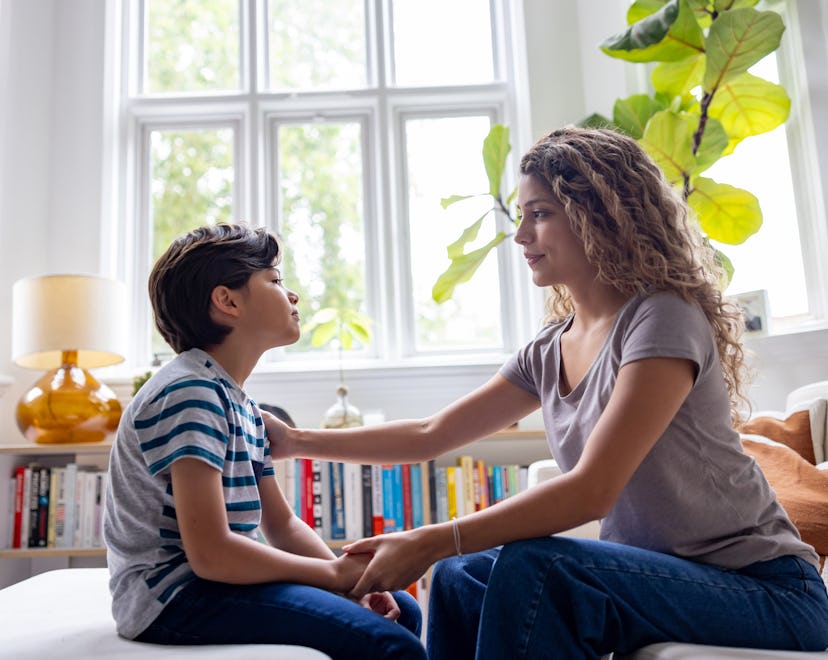Parenting

How To Talk To Your Kids About War & Help Them Feel Safe
Wars continue to happen in all corners of the world, and children are going to have questions.
No parent wants their child to know about war. We want our kids to feel safe, loved, and free from worry, but this is not always possible. Wars continue to happen in all corners of the world, and children are going to find out about them whether we want them to or not. They’ll find out at school, from friends, online. And even though it feels terribly difficult, especially when we are deeply afraid ourselves, there will come a time when we need to talk to our kids about frightening world events like war. Here are a few things to consider as you approach these difficult conversations.
Consider their age.
While every child and every family is different, UNICEF recommends that parents try to be mindful of age-appropriateness when discussing big world events like war. Some younger children might not yet have the capacity to comprehend. UNICEF recommends parents “speak calmly and be mindful of your body language” as children are sensitive to our emotional cues and facial expressions.
Stay ahead of the news.
If there is going to be considerable news coverage of a war or conflict and you know your child will be likely to find out, try to be the first one to explain it to them. Dr. Harold Koplewicz, president of the Child Mind Institute and child psychologist, advises parents and caregivers to try to break the news to their children before they have the chance to stumble across a frightening headline or hear the news from another child. “Don’t delay telling your children about what’s happened … You want to be able to convey the facts, however painful, and set the emotional tone,” Koplewicz suggests.
Let the news sink in before having the Big Talk.
This is a tough one, but once you have given your kids the basic shell of information about war or conflict happening in the world, take a beat before heading into a conversation about it. Ask them about what they might have already heard as the constant influx of information on social media could mean that they’ve already seen upsetting images. Once this new information has sunk in, you might need to get a handle on your own emotions before launching into an explanation on an issue as large and terrifying as war. “A conversation with your child about a big, scary, somewhat incomprehensible topic is not the right place to work out your emotions,” board-certified family physician Dr. Deborah Gilboa told TODAY.
Let them ask questions.
Kids (as most parents know) are wiser than they seem, and if you listen to the way they ask their questions, you can let that be your guide for how to respond. “Let them lead with their questions. You want to do your best to answer honestly while being mindful not to overwhelm them with too much information. Try not to give too much graphic content, or things that aren’t age-appropriate,” Jamie Powers, program director for the Center for Children & Families at Glens Falls Hospital, told The Post-Star.
Try to be as honest with your information as you can, without going overboard. It may feel like walking a tightrope, but the way you explain war to your children could affect the way they see the world down the road. With that in mind, the American Academy of Child and Adolescent Psychiatry (AACAP) recommends parents “avoid stereotyping groups of people by race, nationality, or religion. Use the opportunity to teach tolerance and explain prejudice.”
Don’t minimize their fears.
Questions like “Am I safe?” or “Are we all going to die?” are so complicated to answer, but kids need to know that they are allowed to ask them. The American Psychological Association (APA) recommends parents reassure their kids that they are safe, stay calm, and tell them that it’s absolutely okay to have questions.
Provide support.
The AACAP also recommends coordinating the sharing of information with your child’s teacher, as well as family and friends. Try limiting the amount of violent or troubling images your child sees on television or the internet. And, if you do notice any physical or emotional signs of stress, or any excessive fixation with violence, the AACAP recommends that you contact a mental health professional.
Avoid spreading stigma.
Conflict and war has a tendency to bring out a lot of generalizations in people that do not serve any of us. People can lean on discrimination and even racism when they are afraid, and it’s vitally important to avoid wording like “bad people” when talking about conflict. Instead, UNICEF recommends focusing on the people who might be affected by the war to encourage compassion. People who are forced to flee their home, or humanitarian organizations who are trying to help those in need.
Nobody wants children to worry about war, but the best thing you can do is give them the tools to handle that information to the best of their ability. With compassion, thoughtfulness, and honesty.
This article was originally published on